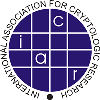Call for papers
Original papers on practical and theoretical aspects of cryptology are solicited for submission to Eurocrypt 2016, the 35th Annual Eurocrypt Conference. Eurocrypt 2016 is organized by the International Association for Cryptologic Research (IACR).
Instructions for Authors
Submissions must be at most 30 pages using Springer's LNCS format, excluding any supplementary material (formerly known as appendices). Clearly marked supplementary material may follow after the main body of the submission, or can be submitted as a separate file. This may also include program code or experimental data. Details on the Springer LNCS format can be obtained via http://www.springer.de/comp/lncs/authors.html. For accepted papers the length of the final version for Springer's LNCS will be at most 30 pages including title, abstract, references and appendices, in the llncs class format.
It is encouraged that the submission be processed in LaTeX2e according to the instructions listed on Springer. These instructions are mandatory for the final, camera-ready versions. Submitted papers must be in PDF format and submitted electronically via the submission server. The list of authors should include all those, and only those, who have contributed to the submission. Submission deadline: October 8th, 2015, 10:00 UTC.
The submission must be anonymous with no author names, affiliations or obvious references. It should begin with a title, a short abstract, and an introduction. The introduction should summarize the contributions of the paper at the level understandable for a non-expert reader. The submission should be intelligible without the supplementary material, as reviewers are not required to access the supplementary material.
Submissions must not substantially duplicate work that any of the authors has published in a journal or a conference/workshop with proceedings, or has submitted/is planning to submit to a journal or other conferences/workshops with proceedings before notification of Eurocrypt. Accepted submissions may not appear in any other conference or workshop that has proceedings. IACR reserves the right to share information about submissions with other program committees to detect parallel submissions and the IACR policy on irregular submissions will be strictly enforced. For further details, see http://www.iacr.org/docs/.
Submissions not meeting these guidelines may be rejected without consideration of their merits. In particular, the Springer LNCS format must be used without changing margins or default fonts.
Program committee members are allowed to submit one paper, and a second one if both submissions are co-authored. Any PC member submission will be held to higher standards than other submissions. Program chairs are not allowed to submit.
Schedule
We will run a two stage reviewing process, i.e. the committee will issue rejections for some papers after round one in case we do not see any support for a revision through a rebuttal, and will invite authors of papers that make it into round two to write rebuttals. These rebuttals will be then taken into account for the second discussion phase and the decision.
The schedule is as follows:
- Submission deadline: October 8th, 2015 (10:00 UTC)
- First round notification: December 10th, 2015
- Rebuttals due: December 15th, 2015
- Final notifications of acceptance or rejection: January 25th, 2016
- Final version due: February 21st, 2016
Conference Proceedings
Proceedings will be published in Springer's Lecture Notes in Computer Science and will be available at the conference. Authors of accepted papers must complete the IACR copyright assignment form for their work to be published in the proceedings, and guarantee that their paper will be presented at the conference. The final versions of the accepted papers will be due on February 21st, 2016.
Program Committee
Michel Abdalla (Ecole Normale Superieure and CNRS, France)
Shweta Agrawal (IIT Delhi, India)
Elette Boyle (IDC Herzliya, Israel)
Christina Brzuska (Microsoft Research, UK)
Ran Canetti (Tel Aviv University, Israel, and Boston University, USA)
David Cash (Rutgers University, USA)
Dario Catalano (University of Catania, Italy)
Jean-Sebastien Coron (University of Luxembourg, Luxembourg), Co-Chair
Cas Cremers (University of Oxford, UK)
Yevgeniy Dodis (New York University, USA)
Nico Döttling (Aarhus University, Denmark)
Pooya Farshim (Queen's University Belfast, UK)
Jean-Charles Faugère (INRIA Paris-Rocquencourt, France)
Sebastian Faust (Ruhr-University Bochum, Germany)
Dario Fiore (IMDEA Software Institute, Spain)
Marc Fischlin (TU Darmstadt, Germany), Co-Chair
Georg Fuchsbauer (IST Austria)
Juan Garay (Yahoo Labs, USA)
Vipul Goyal (Microsoft Research, India)
Tim Güneysu (University of Bremen, Germany)
Shai Halevi (IBM, USA)
Goichiro Hanaoka (AIST, Japan)
Martin Hirt (ETH Zurich, Switzerland)
Dennis Hofheinz (Karlsruhe KIT, Germany)
Tibor Jager (Ruhr-University Bochum, Germany)
Abhishek Jain (Johns Hopkins University, USA)
Aniket Kate (Purdue University)
Dmitry Khovratovich (University of Luxembourg, Luxembourg)
Vadim Lyubashevsky (Ecole Normale Superieure, France)
Sarah Meiklejohn (University College London, UK)
Mridul Nandi (Indian Statistical Institute, Kokata)
María Naya-Plasencia (INRIA, France)
Svetla Nikova (KU Leuven, Belgium)
Adam O'Neill (Georgetown University, USA)
Claudio Orlandi (Aarhus University, Denmark)
Josef Pieprzyk (Queensland University of Technology, Australia)
Mariana Raykova (Yale University, USA)
Thomas Ristenpart (Cornell Tech, USA)
Matthieu Rivain (CryptoExperts, France)
Arnab Roy (Fujitsu Laboratories of America)
Benedikt Schmidt (IMDEA Software Institute, Spain)
Thomas Schneider (TU Darmstadt, Germany)
Berry Schoenmakers (TU Eindhoven, The Netherlands)
Peter Schwabe (Radboud University, The Netherlands)
Yannick Seurin (ANSSI, France)
Thomas Shrimpton (University of Florida, USA)
Nigel Smart (University of Bristol, UK)
John Steinberger (Tsinghua University, China)
Ron Steinfeld (Monash University, Australia)
Emmanuel Thomé (INRIA Nancy, France)
Yosuke Todo (NTT, Japan)
Dominique Unruh (University of Tartu, Estonia)
Daniele Venturi (Sapienza University of Rome, Italy)
Ivan Visconti (University of Salerno, Italy)
Stefan Wolf (USI Lugano, Switzerland)
